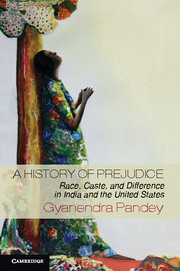2 - Prejudice as Difference
Published online by Cambridge University Press: 05 February 2013
Summary
Prejudice, I have suggested, often parades as difference. The positing of difference works as a means of othering – or otherization. Let me spell out the argument in terms of dominant discourses of social and cultural difference (that is, the common sense of the modern) before turning to an investigation of how subaltern assemblages and constituencies like African Americans and Dalits have, in their turn, deployed ideas of difference (and sameness) in their own political struggles.
A prominent theme in the history of the world since the eighteenth century has been the promise of emancipation, including the emancipation of societies and groups marked out as “backward,” disadvantaged, or simply adrift from the “mainstream” of human history and progress as it has been conceived since the Enlightenment. It is against this background that differences of gender, sexuality, caste, race, and so on were foregrounded by the state (colonial and noncolonial), and by dominant groups and classes, in different parts of the world through most of the nineteenth and twentieth centuries. It is important to note the terms of this differentiation. Men are not described as different; it is women who are. Foreign colonizers are not different; the colonized are. Caste Hindus are not different in India; it is Muslims, “tribals,” and Dalits (or ex-Untouchables) who are. White Anglo-Saxon Protestant heterosexual males are not different in the United States; at one time or another, everybody else is. White Australians are not different; Vietnamese boat people, Fijian migrants to Australia, and, astonishingly, Australian Aboriginals are.
- Type
- Chapter
- Information
- A History of PrejudiceRace, Caste, and Difference in India and the United States, pp. 34 - 60Publisher: Cambridge University PressPrint publication year: 2013



